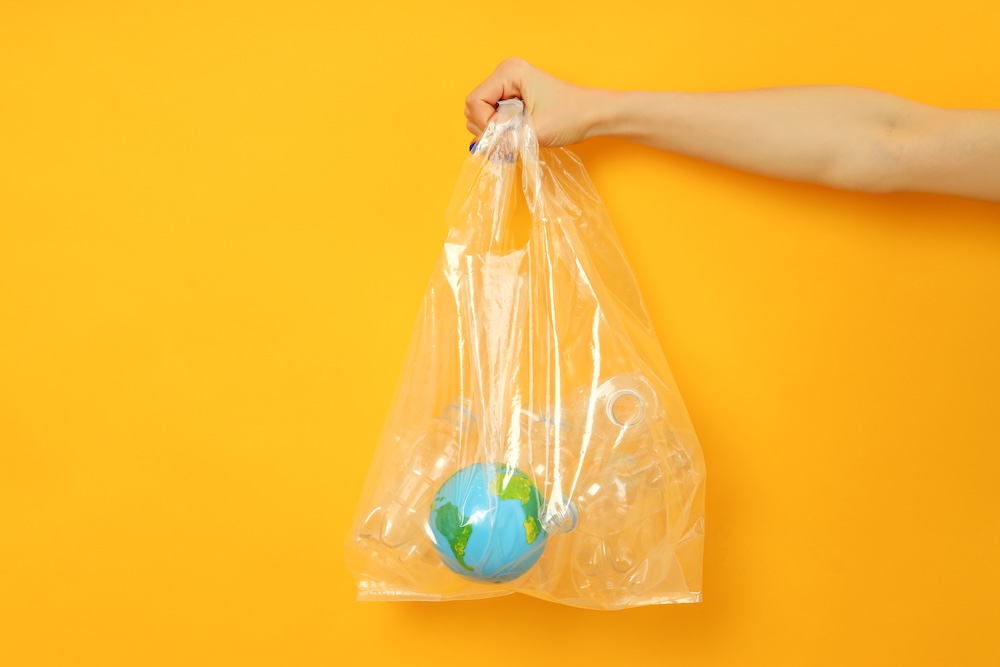Plastic bags look flimsy, harmless even. They’re light, thin, and free at the checkout counter. But each bag is tied directly to one of the most destructive industries on Earth.
Plastic bags are not just waste — they are fossil fuels in another form.
From extraction to production to disposal, every bag requires oil and gas. And once it’s used, usually for less than 15 minutes, it lingers for centuries. Asking how much fossil fuel is used to produce plastic bags isn’t just a question of numbers. It’s a question of priorities: why are we spending precious resources on products designed to be thrown away?
From Oil Well to Checkout Counter
Most plastic bags are made from polyethylene (PE), a polymer derived from ethylene gas. Ethylene is produced by cracking fossil fuels — primarily crude oil and natural gas.
The journey looks like this:
- Extraction: Oil and gas are drilled, mined, or fracked.
- Processing: Crude oil or natural gas liquids are refined into ethane or naphtha.
- Cracking: Ethane and naphtha are “cracked” at high heat to produce ethylene.
- Polymerization: Ethylene molecules are bonded to form polyethylene.
- Manufacturing: Polyethylene pellets are melted, extruded, and shaped into bags.
Every stage consumes energy, releases emissions, and leaves behind toxic byproducts.
The Numbers Behind Each Bag
- Roughly 8% of global oil production is used to make plastics (International Energy Agency, 2018). Half of that is raw feedstock, and the other half fuels the manufacturing process.
- For plastic bags specifically, estimates show about 2–3% of total global oil consumption goes to polyethylene production, much of it for bags and films.
- Producing just 14 plastic bags requires the same amount of fuel as driving one mile in a car.
- In the United States alone, 100 billion plastic bags are used each year. That’s the energy equivalent of nearly 12 million barrels of oil.
When you hold a plastic bag, you’re holding a fossil fuel product. Light in your hand, heavy in its footprint.
The Hidden Emissions of Bags
The fossil fuel link doesn’t end at production. Plastic bags contribute to climate emissions at every stage:
- Extraction: Drilling and fracking release methane, a greenhouse gas far more potent than CO₂.
- Refining: Cracking ethane into ethylene is one of the most energy-intensive industrial processes.
- Transport: Oil and gas move across oceans and pipelines before becoming pellets.
- Disposal: Landfilling and incineration release emissions. Open burning, common in poorer nations, produces toxic black carbon.
By 2050, plastics like bags could account for up to 20% of global oil consumption if production continues unchecked.
The Illusion of Cheapness
Plastic bags are handed out for free. But they are anything but free. The true costs are hidden:
- Subsidized fossil fuel extraction lowers the price.
- Municipalities pay to collect and manage bag waste.
- Communities bear the health costs of pollution and toxic emissions.
- Oceans and ecosystems pay the ultimate price, with marine life entangled or killed.
The “cheapness” of bags is a lie — one made possible by fossil fuel subsidies and the externalization of environmental costs.
Don’t We Deserve More Than Throwing Away Oil?
Think about it. Oil is a finite resource. It took millions of years to form. It fuels cars, planes, and power grids. Yet we are using it to make bags that carry groceries for minutes before being tossed.
Don’t we deserve better than to burn through our resources for something so trivial? Don’t we deserve materials designed to last, not to pollute?
A plastic bag is a snapshot of a broken system: precious energy turned into trash by design.
Better Alternatives Exist
The good news is that plastic bags are among the easiest items to replace:
- Reusable fabric bags: Cotton, hemp, and recycled synthetics last years and can carry more weight.
- Paper bags: Compostable and recyclable, though not impact-free.
- Basket and tote systems: Used for centuries before plastic took over.
Many countries and cities have already banned or restricted plastic bags. Where bans exist, bag litter drops dramatically, reusable habits take hold, and emissions shrink.
What You Can Do
- Refuse plastic bags — carry a reusable every time.
- Support local and national bag bans.
- Educate others about the fossil fuel connection.
- Challenge stores that still distribute bags as “free.”
Every refusal is a statement: fossil fuels are too valuable — and too destructive — to waste on throwaway bags.
FAQs
Aren’t plastic bags lightweight and efficient compared to alternatives?
They are light to carry, but heavy in environmental cost. Their production depends on fossil fuels, and their persistence creates pollution for centuries.
Is paper always better?
Paper has its own impacts (deforestation, energy use). But it decomposes naturally and fits into circular waste systems. Plastic does not.
What about “biodegradable” or “compostable” bags?
Some certified compostable bags work in proper facilities. Many so-called “biodegradable” bags still fragment into microplastics. They’re often greenwash, not a true solution.
Does refusing plastic bags actually matter?
Yes. Where bans and refusals spread, cultural change follows. Bag waste plummets, and corporations adapt quickly.
Final Thoughts
Plastic bags are fossil fuels disguised as convenience. They burn energy, pollute ecosystems, and lock us deeper into oil dependency — all for a product used for minutes and discarded.
Asking how much fossil fuel goes into plastic bags reveals a painful truth: too much for something worth so little.
Refusing bags isn’t just about waste. It’s about demanding better priorities. Because trading oil and gas for trash is the most shortsighted bargain of all.








